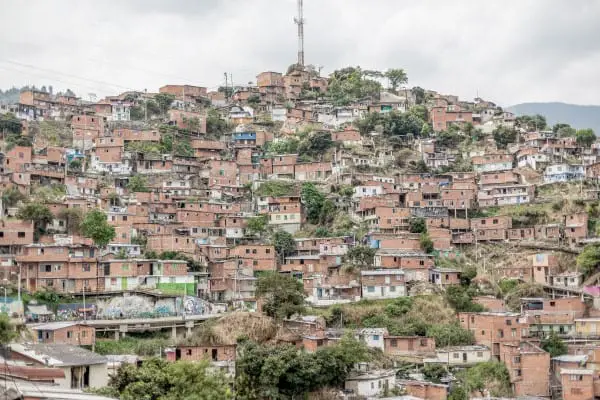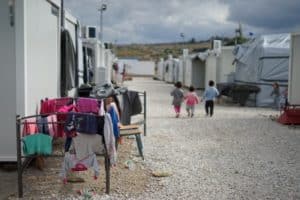This page contains affiliate links. This means if you a follow a link and make a purchase, at no additional cost to you, Humanitarian Careers will receive a commission. Thank you for supporting the site.
Out of 195 countries in the world, only 81 are considered fully developed. This means the majority of nations globally have failed to achieve a high level of prosperity resulting in many of their citizens living in poverty. There are many factors that affect a country’s development. A nations geography is increasingly being seen as one of the most important ones. But how can a country’s geography impact it’s development? In fact, there are several ways…
Geography Can Create Natural Defensive Barriers
A first way that geography affects a country’s development is by providing natural defensive barriers.
The geography of a country is key to its defences. Geographical features, including mountains, rivers, lakes, and forests, jungles, and deserts, provide natural barriers that are difficult for armies to cross. Even in the modern age, military commanders understand the importance of geography when defending or attacking another nation.
Having natural defensive barriers can massively affect how a country develops. Nations with geographical defences are able to spend less on their militaries. Nations that have geographical features that form natural defences also develop more cohesively. These nations have generally developed to be more entrepreneurial, and trade focused, as they have historically had less need to wage war on surrounding nations. As a result, having natural geographical defences can massively help a country develop.
Nations that lack natural defensive features not only have to spend more on their militaries but are also more likely to try and dominate surrounding nations in an attempt to secure more easily defensible borders. Doing this creates an economic drain on a country, further limiting its development.
Countries Need Navigable Rivers and Access to The Sea To Develop
A second way that geography can impact a nation’s development is if a country has navigable rivers, and/or access to the sea.
Before the invention or roads, railroads or air travel, water ways were essentially the only way goods or people could move any great distance. Overland travel was extremely difficult, and often dangerous. Because of this, nations that had a natural network of rivers, or had long coastlines, became much more developed.
Having geographical features such as navigable rivers or extensive coastline helps countries develop in two main ways. Firstly, it helps internal trade as goods can be transported more easily. Secondly, it helps nations become more cohesive as states can better expand their reach, including extending political systems, public services, and law enforcement. Both factors have been vital in how many nations became developed. Countries without rivers or coastlines have struggled generally to become wealthy.
Nations Need Sufficient Arable Flat Land
A third way that geography affects a country’s development is through providing enough arable flat land.
A sufficient and reliable food supply is one of the most important things a country needs to develop. Countries with large amounts of flat land, good soil conditions, sufficient water, and stable climates, become developed because they can more easily provide the food their populations need.
Nations that lack good arable land are more susceptible to famines and food insecurity. When people don’t have enough to eat, their economic actively is reduced as they either starve, move, or work to secure food. One of the biggest ways that geography can hold back a country’s development is if a nation doesn’t have enough farmable land to feed its people.
Mountainous countries can also often struggle with food insecurity. Generally, crops cannot be grown in mountainous terrain, meaning that countries that have a lot of mountains struggle to have enough land to grow the food they need. This means they often rely on importing food, which increases their reliance of other nations. Although some mountainous nations have become developed, many others have struggled to become wealthy.
International Development Online Courses
If you want to know about how geography affects a country’s development, we recommend taking an online short course. We think the Management of International Development: Towards Agenda 2030 course is great. It looks at the current international development model as well as the trends that will be key to global development in the near future. Follow the link to the course’s page for more information.
We also think the online course Sustainable Development in the 21st Century by Yonsei University to be one of the best for those interested in international development. Delivered by formed UN Secretary General Ban-ki Moon, the online course would be a great addition to the CV of anyone interested in how countries develop development. The link is to the course’s page.
If you are interested in the practical methods used on international development projects, we recommend the online course How To Design & Fund International Development NGO Projects. The course teaches students the tools needed to establish and run impactful development projects. Click the link to visit the course’s page for more information.
Abundant Natural Resources Can Help, And Hinder, Development
Another geographical factor that can affect a country’s development is whether it has natural resources or not.
Natural resources, including oil, gas, coal, metals, timber, and uranium, are the backbone of the modern global economy. Ever since nations began to industrialise in the late 18th and 19th Centuries, natural resources have been key to their development.
Some countries have used the natural resources they have to become prosperous. Being able to exploit their own resources and not having to rely on conquering or trading with other nations to acquire resources has meant these nations have remained mostly self-sufficient. This has been a key factor in their development.
There are other countries that are also blessed with abundant natural resources, however, have been unable to exploit these effectively and it has in fact hindered their development. This is known as the resource curse. Enormous reserves of natural resources can mean a country’s economy becomes overly focused on resource extraction and other industries fail to grow. This has held back many countries from developing.
A Nations Climate Is Key to Its Development
A further geographical factor that impacts a country’s development is its climate.
A nation’s climate is fundamental to how a country forms. It affects everything from the crops that grow and wildlife that live there, to where people live and what economic activities they undertake. Generally, it’s believed that countries with colder and more varied climates become more developed because the low temperatures and long winters force these societies to become more organised. This then results in greater economic growth. Although it is true hot countries can become developed, and there are nations with temperate climates that have remained poor, the fact these instances are limited shows how important climate is to a country’s development.
Another climatic factor that can affect a nation’s development is extreme weather. Cyclones, typhoons, floods, and droughts all destroy livelihoods and stop communities from being economically productive. Many countries that experience frequent extreme weather events fail to develop.
Countries Need a Sufficient Water Supply to Develop
Water supply is another geographical factor that can massively affect a nation’s development.
All nations need a steady supply of water. It is vital for humans to drink and clean with, but it is also required for agriculture and industry. Nations that have adequate water supplies are able to develop because they can secure the water they need easily. This reduces their need to use resources to acquire water and therefore allows them to direct economic activity towards areas that make them prosperous.
Nations without sufficient water supplies struggle to develop. Agriculture is held back when water supplies are limited. People who don’t have access to clean water have their economic activity curtailed as they become sick regularly or must travel long distances to get water.
A country’s water supply, and the quality and sustainability of that supply, is a major geographical factor that affects every nation’s development.
Mountainous Countries Can Struggle to Develop
A final way that geography can impact a nation’s development is if a country is very mountainous.
Mountains create natural barriers. They are hard for people to cross. This can be beneficial for a country if it has mountains that form a natural border. However, if a nation has a mountainous interior, it can hold back it’s development. This is because it makes moving people and goods around the nation very difficult.
Countries that are very mountainous must spend significantly more on infrastructure in order to overcome the geographical obstacle they pose. Some countries have been able to do this, building railways, roads, bridges, and tunnels so that the nation is fully connected. However, these countries are few. Most countries that are mountainous lack the funds to invest in the infrastructure they need. This creates a vicious cycle where the lack of infrastructure makes doing business in the country difficult, which then keeps the nation poor meaning it lacks the funds to invest in better infrastructure.





